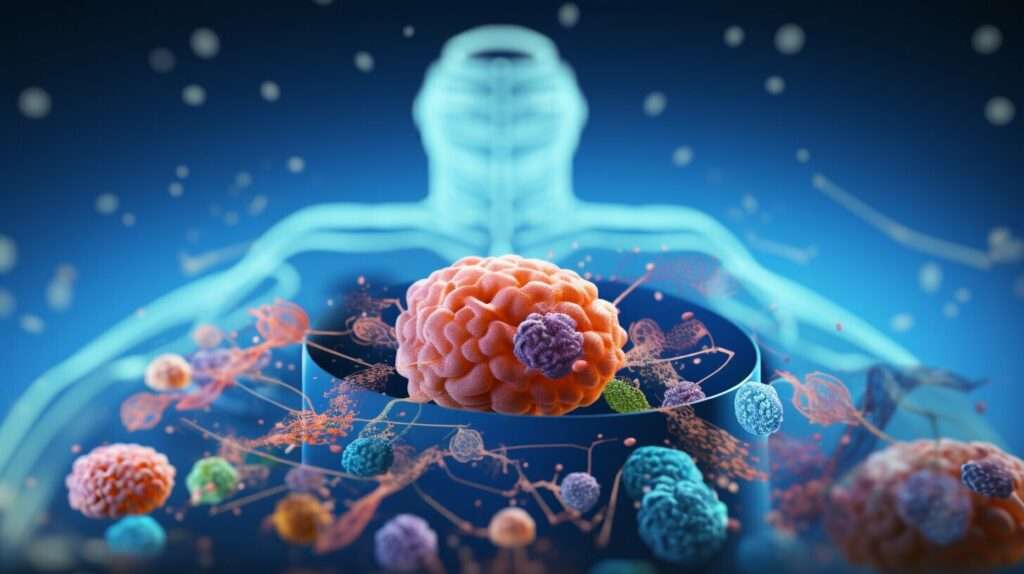If you’ve ever had a “gut feeling” or felt butterflies in your stomach when nervous, you already know that there is a connection between the gut and the brain. But did you know that this connection goes beyond just physical sensations? Recent research has uncovered a complex communication system between the gut and the brain, known as the gut-brain axis, that has a significant impact on mental health and overall well-being.
Understanding the gut-brain connection and its role in anxiety is crucial for managing and reducing symptoms. In this article, we’ll explore the science behind the gut-brain axis and its impact on mental health. We’ll also discuss the relationship between gut health and anxiety and provide insights on how to improve your gut health for optimal emotional well-being.
Key Takeaways:
- There is a complex communication system between the gut and the brain known as the gut-brain axis.
- The gut-brain connection has a significant impact on mental health and overall well-being.
- Understanding the gut-brain connection is essential for managing and reducing anxiety symptoms.
- Improving gut health can positively influence emotional well-being.
Understanding the Gut-Brain Axis
Did you know that your gut and brain are in constant communication with each other? This connection is known as the gut-brain axis and it plays a crucial role in your mental health and overall well-being.
The gut-brain axis is a complex network of nerves, hormones, and bacteria that work together to regulate various bodily functions, including cognitive function and emotional regulation.
At the center of the gut-brain axis is the enteric nervous system, which is responsible for controlling digestion and communicating with the central nervous system. This communication allows the gut to influence brain function and vice versa.
Studies have shown that disruptions in the gut-brain axis can contribute to mental health issues such as anxiety and depression, highlighting the importance of understanding and maintaining this connection for optimal health.

The Link between Gut Health and Mental Health
Your gut health can have a significant impact on your mental health. Studies have shown that imbalances in gut bacteria can lead to negative changes in mood and behavior, resulting in conditions such as anxiety and depression.
The gut-brain connection plays a critical role in this interaction. The enteric nervous system, sometimes referred to as the “second brain,” communicates with the central nervous system and influences cognitive and emotional function.
The gut also produces neurotransmitters, including serotonin, dopamine, and GABA, which regulate mood and emotions. An unhealthy gut can disrupt the production of these neurotransmitters, leading to imbalances that can contribute to anxiety and other mental health disorders.
Emotional well-being is also linked to gut health. Research has found that individuals with irritable bowel syndrome (IBS) have higher rates of anxiety and depression. IBS and other gut-brain axis disorders can cause inflammation in the gut, leading to systemic inflammation and negatively impacting mental health.
By taking care of your gut health, you may be able to manage anxiety symptoms and improve your mental well-being. Eating a diet rich in fiber, whole foods, and probiotics can help promote a healthy gut. Probiotic supplements may also be beneficial in reducing anxiety symptoms and improving gut health.
Remember, taking care of your gut health is essential for optimal mental health. By understanding the link between gut health and mental health, you can take proactive steps to prioritize your overall well-being.

Gut-Brain Communication and Emotional Well-Being
The gut and brain are in constant communication, influencing our mental and emotional states. This communication is essential for regulating emotions and managing anxiety. Emotions are processed in the brain, but they are also felt in the gut, which is why emotions are often referred to as “gut feelings.”
Studies have shown that the gut can affect emotional well-being by producing neurotransmitters such as serotonin and dopamine. Serotonin is a neurotransmitter that regulates mood, sleep, and appetite, among other things, and 90% of serotonin is produced in the gut. An imbalance in gut bacteria can lead to a decrease in serotonin levels, which is often associated with depression and anxiety.
Stress can also impact gut health, leading to inflammation and changes in gut bacteria. This, in turn, can affect the production of neurotransmitters and exacerbate anxiety symptoms. Therefore, it is important to maintain a healthy gut to ensure optimal emotional well-being.
There are various ways to improve gut-brain communication for emotional well-being. One way is through lifestyle changes such as regular exercise, a healthy diet, and stress management techniques like meditation or yoga. Another way is by taking probiotics, which are live bacteria that can benefit the gut microbiome and improve mood regulation.
Overall, the gut-brain connection plays a significant role in emotional well-being. By maintaining a healthy gut and improving gut-brain communication, you can ensure optimal mental health and reduce anxiety symptoms.

The Role of Gut Microbiome in Anxiety
Anxiety can be a debilitating condition that affects many people, and researchers are starting to understand that the gut microbiome may play a role in its development. The gut is home to trillions of bacteria that can have a profound impact on our well-being. One way in which these bacteria can influence mental health is through their effect on serotonin production.
Serotonin is a neurotransmitter that is often referred to as the “feel-good” hormone because it helps to regulate mood. It is estimated that 90% of the body’s serotonin is produced in the gut, which means that the state of your gut bacteria can directly impact your mood and anxiety levels.
Studies have shown that people with anxiety disorders often have imbalances in their gut microbiome, such as a decrease in beneficial bacteria or an increase in harmful bacteria. These imbalances can lead to inflammation in the gut and trigger the release of stress hormones that can affect cognitive function and emotional well-being.
Improving gut health through diet and supplementation with probiotics and prebiotics may help to rebalance the gut microbiome and reduce anxiety symptoms. Certain strains of probiotics, such as Lactobacillus and Bifidobacterium, have been shown to increase serotonin production and improve mental health.
It’s important to note that gut health is not the only factor that contributes to anxiety, and it’s always best to consult with a healthcare provider if you are experiencing symptoms of anxiety. However, taking steps to improve gut health can be a valuable tool in managing anxiety and improving overall well-being.

Probiotics for Anxiety Relief
If you’re looking for a natural way to manage your anxiety symptoms, you might want to consider taking probiotics. Probiotics are live bacteria and yeasts that are good for your gut health. They can be found in fermented foods like yogurt, kefir, and kimchi, as well as in supplement form.
Research has shown that probiotics can positively influence the gut-brain connection, which can improve mental well-being. Certain strains of probiotics, such as Lactobacillus and Bifidobacterium, can reduce symptoms of anxiety and depression by producing neurotransmitters like serotonin and dopamine.
Additionally, probiotics can help regulate the immune system, which can reduce inflammation in the gut. Inflammation has been linked to a number of mental health conditions, including anxiety.
It’s important to note that not all probiotics are created equal. Different strains have different effects on the body, and some may not be effective for managing anxiety. It’s best to talk to your healthcare provider or a registered dietitian to determine which probiotic supplement is right for you.
| Probiotic Strain | Potential Benefits |
|---|---|
| Lactobacillus | May reduce anxiety and depression symptoms |
| Bifidobacterium | May improve mood and cognitive function |
| Streptococcus | May reduce symptoms of stress and anxiety |
In summary, probiotics can be a natural and effective way to manage anxiety symptoms by positively influencing the gut-brain connection and regulating the immune system. Talk to your healthcare provider or a registered dietitian to determine which probiotic supplement is right for you.

Gut-Brain Axis Disorders and Anxiety
Your gut and brain are in constant communication, and disruptions to this communication can contribute to anxiety and other mental health issues. One example of this is irritable bowel syndrome (IBS), a common gut-brain axis disorder that affects millions of people.
IBS can cause abdominal pain, diarrhea, constipation, and other uncomfortable symptoms, which can lead to anxiety and other psychological distress. In fact, research has shown that individuals with IBS have higher rates of anxiety and depression than the general population.
The exact relationship between IBS and anxiety is complex and not fully understood. It is thought that the inflammation and immune system dysfunction that occur in IBS can cause changes in gut bacteria and neurotransmitter levels, which in turn affect brain function and mood.
If you suffer from IBS or another gut-brain axis disorder, it is essential to address both the physical and psychological symptoms of the condition. This may involve dietary changes, stress management techniques, and other therapies to improve gut health and manage anxiety.

Image Source: seowriting.ai
The Impact of Gut Health on Cognitive Anxiety
If you struggle with anxiety, you may be familiar with the mental and physical symptoms that come with it. But did you know that your gut health could be playing a role in cognitive anxiety?
Your gut and brain are constantly communicating with each other through the gut-brain axis, and this communication affects many aspects of your health, including cognitive function and anxiety levels.
A healthy gut is essential for optimal cognitive function, as it helps to regulate inflammation and promote the growth of beneficial gut bacteria. Imbalances in the gut, such as an overgrowth of harmful bacteria, can lead to inflammation and disrupt the delicate balance of neurotransmitters and hormones in the brain that regulate mood, leading to increased anxiety levels.

Research has shown that improving your gut health through a healthy diet, exercise, and probiotics can help reduce anxiety symptoms and improve cognitive function. Probiotic supplements, in particular, have been shown to increase the production of neurotransmitters like serotonin, which can help regulate mood and reduce anxiety levels.
By taking care of your gut, you can not only improve your overall health but also manage your anxiety symptoms and boost your cognitive function.
Gut-Brain Communication and Mood
Have you ever noticed how your mood changes after a big meal? It turns out, the communication between your gut and brain plays a significant role in regulating your mood. The gut contains over 100 million neurons, which send messages to the brain via the vagus nerve. These messages can affect the production and regulation of neurotransmitters and hormones, which in turn impact mood and emotions.
One important neurotransmitter involved in mood regulation is serotonin. In fact, the majority of serotonin in the body is produced in the gut. An imbalance of gut bacteria can lead to decreased serotonin production, which has been linked to symptoms of depression and anxiety. Additionally, the gut microbiome can impact the production and regulation of hormones such as cortisol, which can also influence mood.
It’s clear that maintaining a healthy gut is crucial for optimal mental well-being. The communication between the gut and brain influences many aspects of our mental and emotional health, including mood regulation. Keeping the gut microbiome in balance through a healthy diet and probiotic supplementation may help manage anxiety and improve overall mood.

The Impact of Gut Health on Anxiety Levels
Anxiety is a complex condition that can have various root causes. However, research suggests that maintaining a healthy gut can play a significant role in reducing anxiety symptoms. The gut and brain are interconnected through the gut-brain axis, which means an unhealthy gut can lead to poor mental health.
Studies have shown that imbalances in gut bacteria can affect the production of neurotransmitters like serotonin, which plays a crucial role in regulating mood and anxiety. When the gut microbiome is imbalanced, it can also lead to inflammation, which is linked to various mental health disorders, including anxiety.
Therefore, taking care of your gut health can promote mental well-being and help manage anxiety symptoms. Eating a balanced diet rich in fiber, fruits, and vegetables can improve gut health by promoting the growth of beneficial bacteria. Probiotics can also be an effective way to restore the balance of gut bacteria and improve mental health.
Moreover, exercising regularly and reducing stress can also contribute to a healthy gut and lower anxiety levels. Stress is known to impact gut health and disrupt the gut-brain axis, leading to an increased risk of anxiety and other mental health disorders.

Overall, maintaining gut health is essential for optimal mental well-being. By taking care of your gut, you can reduce inflammation, restore the balance of gut bacteria, and promote the production of neurotransmitters like serotonin. These can all contribute to lower anxiety levels and promote a healthier mind and body.
Gut-Brain Axis and Panic Attacks
If you suffer from panic attacks, you may not think that your gut health could be contributing to your symptoms. However, research suggests that the gut-brain axis plays a significant role in the development of panic disorder.
Imbalances in gut bacteria can lead to an increase in inflammation, which has been linked to anxiety and depression. Inflammation can also negatively impact the production of neurotransmitters, which play a role in regulating mood and anxiety levels.
Additionally, the gut-brain axis can affect the sensitivity of the amygdala, the part of the brain responsible for processing fear and anxiety. When there is an imbalance in gut health, the amygdala may become overactive and trigger a panic attack.
It’s essential to prioritize your gut health if you suffer from panic attacks. Consuming a diet rich in prebiotics and probiotics can help maintain a healthy balance of gut bacteria. Additionally, practicing stress-reducing techniques such as meditation and exercise can help regulate the gut-brain axis and reduce anxiety levels.

It’s important to note that panic attacks can have many different contributing factors, and addressing gut health alone may not be enough to treat them. It’s always best to consult with a healthcare professional for personalized treatment and advice.
Conclusion
Understanding the connection between gut health and mental well-being is crucial for managing anxiety. The gut-brain axis allows for communication between the gut and the brain, affecting everything from emotional well-being to cognitive function.
Maintaining a healthy gut microbiome through the use of probiotics and a balanced diet can positively impact serotonin production, reducing anxiety symptoms. Additionally, imbalances in gut health can contribute to the development of panic disorder and other anxiety-related disorders.
By prioritizing gut health, you can take an active step toward managing and reducing anxiety levels. Remember to prioritize a balanced diet, including probiotics and prebiotics, to keep your gut healthy and your mind at ease.
FAQ
Q: What is the gut-brain connection and its link to anxiety?
A: The gut-brain connection refers to the bidirectional communication between the gut and the brain. Research has shown that this connection plays a crucial role in mental health, including anxiety. Understanding this link is important for maintaining overall well-being.
Q: How does the gut-brain axis work?
A: The gut-brain axis involves the communication between the gut and the brain through the enteric nervous system. This system influences cognitive function and plays a significant role in maintaining a healthy gut-brain connection.
Q: What is the connection between gut health and mental health?
A: Gut health has a direct impact on mental health. Disturbances in gut health can affect mood regulation and emotional well-being. Taking care of your gut health is crucial for maintaining optimal mental well-being.
Q: How does gut-brain communication influence emotional well-being?
A: The communication between the gut and the brain has a profound effect on emotional well-being. A healthy gut-brain connection helps in managing emotions and reducing anxiety symptoms.
Q: How does the gut microbiome contribute to anxiety?
A: The gut microbiome, which comprises trillions of bacteria in the gut, affects anxiety levels. Imbalances in the gut microbiome can impact serotonin production, a neurotransmitter that plays a significant role in regulating anxiety levels.
Q: Can probiotics help relieve anxiety?
A: Probiotics, particularly certain strains, have shown potential benefits in reducing anxiety symptoms. They can positively influence the gut-brain connection and improve mental well-being.
Q: Are there gut-brain axis disorders that can contribute to anxiety?
A: Yes, disorders of the gut-brain axis, such as irritable bowel syndrome (IBS), can contribute to anxiety. These conditions affect gut health and can have a significant impact on mental health.
Q: How does gut health affect cognitive anxiety?
A: Imbalances in gut health can affect cognitive function, contributing to anxiety symptoms. Maintaining a healthy gut is important for managing and reducing cognitive anxiety.
Q: How does gut-brain communication influence mood?
A: Gut-brain communication plays a crucial role in regulating mood. Neurotransmitters and hormones involved in mood regulation can be influenced by the health of the gut, highlighting the importance of a healthy gut-brain connection for maintaining positive mood.
Q: What is the overall impact of gut health on anxiety levels?
A: Maintaining a healthy gut has a significant impact on anxiety levels. Taking care of your gut health can help manage and reduce anxiety symptoms, promoting overall mental well-being.
Q: Is there a connection between the gut-brain axis and panic attacks?
A: Yes, imbalances in the gut-brain axis can contribute to the development of panic attacks. Understanding and addressing gut health is crucial for managing panic disorder.






